Landscape Gardening in Forest Gate
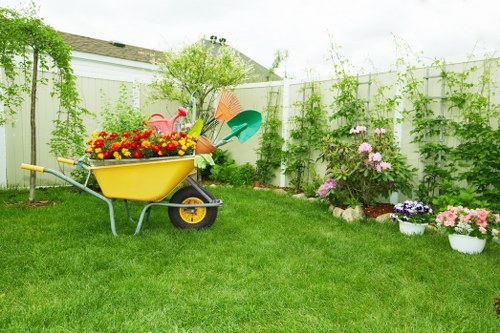
Introduction to Landscape Gardening in Forest Gate
Embarking on a landscape gardening journey in Forest Gate offers a unique blend of urban charm and natural beauty. Whether you're a seasoned gardener or a novice, the diverse flora and vibrant community make Forest Gate an ideal location to create your dream garden.
Forest Gate's temperate climate allows for a wide variety of plants to thrive, giving residents the flexibility to design gardens that range from lush green spaces to colorful floral displays. The area's rich soil and ample rainfall provide the perfect conditions for sustainable gardening practices.
Furthermore, landscape gardening in Forest Gate isn't just about aesthetics; it's about creating a harmonious environment that enhances your living space and contributes to the local ecosystem. With thoughtful planning and the right resources, you can transform your garden into a personal sanctuary.

Planning Your Landscape Design
Assessing Your Garden Space
Before diving into the design process, it's essential to thoroughly assess your garden space. Take note of the sunlight exposure, soil quality, and existing vegetation. Understanding these elements will help you make informed decisions about plant selection and garden layout.
Consider creating a detailed garden plan that outlines the different zones for various plant species, seating areas, and decorative features. This plan will serve as a roadmap, ensuring that your garden remains organized and visually appealing.
Additionally, think about the functional aspects of your garden. Do you want a space for entertaining, a quiet retreat, or a playground for children? Defining the purpose of your garden will guide your design choices and help you create a space that meets your specific needs.
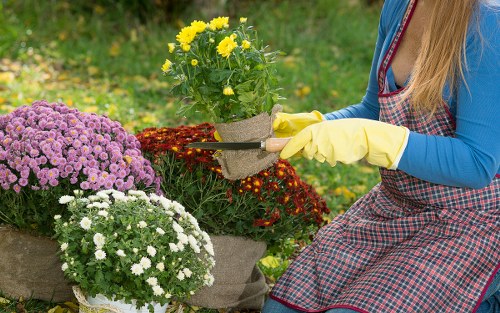
Choosing the Right Plants
Selecting the appropriate plants is crucial for the success of your landscape garden. In Forest Gate, you have access to a variety of native and non-native species that can add texture, color, and structure to your garden.
Opt for native plants whenever possible, as they are well-adapted to the local climate and require less maintenance. Native species also support local wildlife, creating a balanced ecosystem within your garden.
Don't be afraid to mix and match different plant types to create a dynamic and layered look. Combining perennials, annuals, shrubs, and trees can add depth and interest, making your garden a vibrant and ever-changing space.
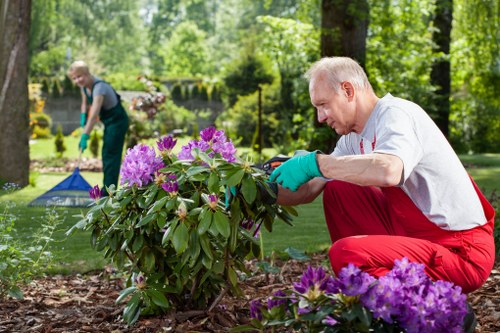
Popular Plants for Forest Gate Gardens
Native Plants
Integrating native plants into your garden not only ensures sustainability but also enhances the natural beauty of Forest Gate. Some popular native plants include:
- Lavender: Known for its fragrant flowers and attractive foliage.
- Foxglove: Tall perennials that add vertical interest.
- Holly: Evergreen shrubs that provide year-round greenery.
These plants are resilient and require minimal care, making them ideal choices for both beginner and experienced gardeners.
Seasonal Flowers
To keep your garden vibrant throughout the year, incorporate a variety of seasonal flowers. These plants provide color and interest, ensuring that your garden never looks dull.
- Spring: Tulips, daffodils, and cherry blossoms.
- Summer: Roses, sunflowers, and marigolds.
- Autumn: Chrysanthemums, asters, and ornamental grasses.
- Winter: Pansies, hellebores, and winterberry.
By carefully selecting seasonal flowers, you can create a garden that blooms all year round.
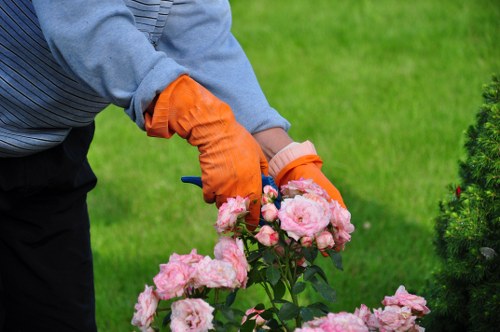
Design Elements in Landscape Gardening
Hardscaping Features
Incorporating hardscaping elements like pathways, patios, and pergolas can add structure and functionality to your garden. These features not only enhance the aesthetic appeal but also provide practical benefits, such as designated areas for relaxation and entertaining.
Choosing materials that complement your garden's style is key. Whether you prefer natural stone, brick, or wood, the right hardscaping materials can tie your garden design together.
Additionally, consider integrating water features like fountains or ponds. These elements can create a serene atmosphere and attract local wildlife, adding to the overall charm of your garden.
Softscaping Techniques
Softscaping focuses on the living aspects of your garden, such as plants, flowers, and trees. Effective softscaping techniques can create a lush and inviting environment.
Implementing companion planting, where certain plants are grown together for mutual benefits, can enhance the health and growth of your garden. For example, planting marigolds alongside tomatoes can deter pests naturally.
Regular pruning and maintenance are essential for softscaping. Keeping your plants healthy and well-shaped ensures that your garden remains beautiful and organized.
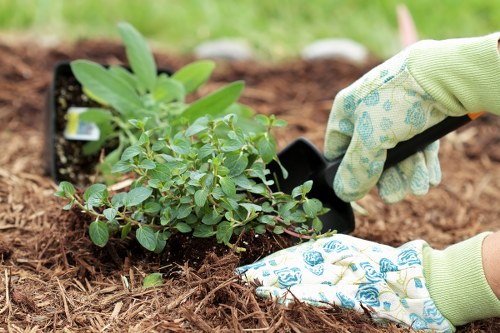
Sustainable Gardening Practices
Water Conservation
Implementing water-efficient practices is vital for sustainable landscape gardening in Forest Gate. Consider installing drip irrigation systems that deliver water directly to the plant roots, minimizing waste.
Mulching is another effective technique. A layer of mulch helps retain moisture, suppresses weeds, and regulates soil temperature, reducing the need for frequent watering.
Collecting rainwater using rain barrels can also contribute to water conservation. This harvested water can be used during dry periods, ensuring that your garden remains hydrated even when rainfall is scarce.
Composting and Soil Health
Maintaining healthy soil is the foundation of a thriving garden. Composting organic waste not only reduces landfill usage but also enriches your soil with essential nutrients.
Add compost to your garden beds to improve soil structure, enhance drainage, and promote beneficial microbial activity. Healthy soil supports robust plant growth and reduces the reliance on chemical fertilizers.
Regularly testing your soil can help you understand its pH levels and nutrient content. Based on the results, you can make informed decisions about amendments to achieve optimal soil health.
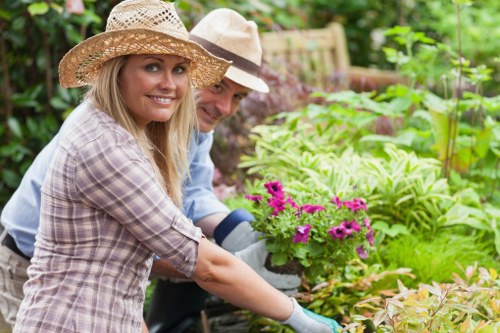
Maintenance Tips for Your Landscape Garden
Regular Pruning and Trimming
Consistent pruning and trimming are essential for keeping your plants healthy and your garden looking tidy. Removing dead or diseased branches prevents the spread of pests and encourages new growth.
Focus on shaping your plants to maintain their natural form and prevent them from becoming overgrown. Regular maintenance also helps in promoting airflow, reducing the risk of fungal diseases.
Using the right tools and techniques ensures that your pruning efforts are effective and do not harm the plants. Invest in quality gardening tools and educate yourself on proper pruning methods.
Weed Control
Weeds compete with your garden plants for nutrients, water, and sunlight. Implementing effective weed control strategies keeps your garden healthy and visually appealing.
Hand-pulling weeds is a sustainable method, especially for smaller gardens. For larger areas, consider using organic mulches or landscape fabrics to suppress weed growth.
Regularly inspecting your garden and addressing weed issues promptly prevents them from becoming a significant problem. Consistent maintenance is key to effective weed management.

Incorporating Wildlife into Your Garden
Attracting Birds
Creating a habitat that attracts birds can add life and movement to your landscape garden. Install bird feeders, birdhouses, and birdbaths to provide food, shelter, and water for local bird species.
Planting native trees and shrubs that produce berries or seeds offers a natural food source for birds. Additionally, providing nesting sites encourages birds to take up residence in your garden.
Using bird-friendly plants and avoiding pesticides ensures a safe environment for your feathered friends. A bird-rich garden contributes to biodiversity and enhances the overall ecosystem.
Supporting Beneficial Insects
Beneficial insects, such as bees and butterflies, play a crucial role in pollination and maintaining garden health. Planting a variety of flowering plants attracts these helpful insects, promoting a balanced garden ecosystem.
Avoiding chemical pesticides protects beneficial insects from harm. Instead, consider natural pest control methods, such as introducing predatory insects or using organic treatments.
Creating insect hotels or providing sunny basking spots can further support beneficial insect populations, ensuring your garden remains vibrant and well-pollinated.

Choosing the Right Tools and Equipment
Essential Gardening Tools
Having the right tools is essential for efficient and effective landscape gardening. Invest in a high-quality spade, pruning shears, garden fork, and a hose with adjustable nozzle for versatile watering options.
Other useful tools include a wheelbarrow for transporting materials, a trowel for planting, and a gardening gloves to protect your hands during work.
Regularly maintaining your tools ensures their longevity and performance. Clean and store them properly after each use to keep them in optimal condition.
Advanced Gardening Equipment
For larger gardens, consider investing in advanced gardening equipment to streamline maintenance tasks. A lawnmower keeps your grass trimmed and neat, while an electric or gas-powered trimmer helps manage overgrown areas.
A soil tester can provide valuable insights into your garden's soil health, allowing you to make informed decisions about amendments and fertilizers.
Automated irrigation systems can save time and ensure consistent watering, especially during busy seasons. These systems can be programmed to deliver the right amount of water based on your garden's needs.

Seasonal Landscape Gardening in Forest Gate
Spring Gardening Tips
Spring is the perfect time to kickstart your landscape gardening projects in Forest Gate. Begin by clearing any winter debris and preparing your garden beds for the new season.
Planting early bloomers like tulips and daffodils adds immediate color to your garden. Additionally, sowing seeds for vegetables and herbs ensures a bountiful harvest later in the year.
Applying a layer of compost or organic fertilizer in spring boosts soil fertility, providing essential nutrients for your plants' growth.
Summer Gardening Strategies
During the summer months, focus on maintaining adequate moisture levels to support your garden's thriving plants. Mulching helps retain soil moisture and keeps root systems cool.
Pruning flowering shrubs and deadheading spent blooms encourages continuous flowering and prevents overcrowding.
Implementing shade cloths or planting windbreaks can protect sensitive plants from intense sunlight and reduce water evaporation.
Autumn Gardening Practices
Autumn is a crucial time for preparing your garden for the colder months. Start by removing spent plants and debris to prevent the spread of pests and diseases.
Planting spring-flowering bulbs in the fall ensures beautiful blooms in the coming year. Additionally, dividing perennials helps maintain plant vigor and promotes healthy growth.
Applying a thick layer of mulch protects plant roots from frost and aids in soil insulation, preserving moisture levels during winter.
Winter Gardening Considerations
While winter may seem dormant, there are still tasks to keep your landscape garden in top shape. Protect tender plants by covering them with frost blankets or burlap.
Pruning deciduous trees and shrubs during winter encourages strong growth in the spring. It's also an ideal time to plan next year's garden layout and order any necessary plants or materials.
Maintaining pathways free of snow and ice ensures safe access to your garden, allowing you to enjoy the serene winter landscape.
Hiring a Professional Landscape Gardener in Forest Gate
Benefits of Professional Services
While DIY gardening can be fulfilling, hiring a professional landscape gardener offers numerous advantages. Professionals bring expertise in design, plant selection, and maintenance, ensuring your garden thrives year-round.
A professional gardener can assess your garden's unique conditions and tailor a plan that maximizes its potential. Their knowledge of local plant varieties and gardening techniques ensures sustainable and aesthetically pleasing results.
Furthermore, outsourcing gardening tasks saves you time and effort, allowing you to focus on other aspects of your life while enjoying a beautifully maintained garden.
Choosing the Right Gardener
Selecting the right landscape gardener is essential for achieving your garden goals. Look for professionals with a strong portfolio, positive reviews, and a clear understanding of your vision.
It's important to communicate your preferences, budget, and expectations clearly. A reputable gardener will collaborate with you to create a customized plan that aligns with your desires and resources.
Additionally, consider the gardener's availability and flexibility to accommodate seasonal changes and unforeseen challenges, ensuring continuous care for your garden.
Contact us today to transform your Forest Gate garden into a stunning oasis with the help of our expert landscape gardening services.
Conclusion
Landscape gardening in Forest Gate is a rewarding endeavor that combines creativity, sustainability, and community spirit. By thoughtfully planning your garden, selecting the right plants, and implementing sustainable practices, you can create a beautiful and functional outdoor space.
Whether you choose to take on the project yourself or enlist the help of a professional, the vibrant environment of Forest Gate provides the perfect backdrop for your gardening aspirations.
Book your service now and embark on a journey to cultivate a garden that not only enhances your home but also contributes positively to the local ecosystem.